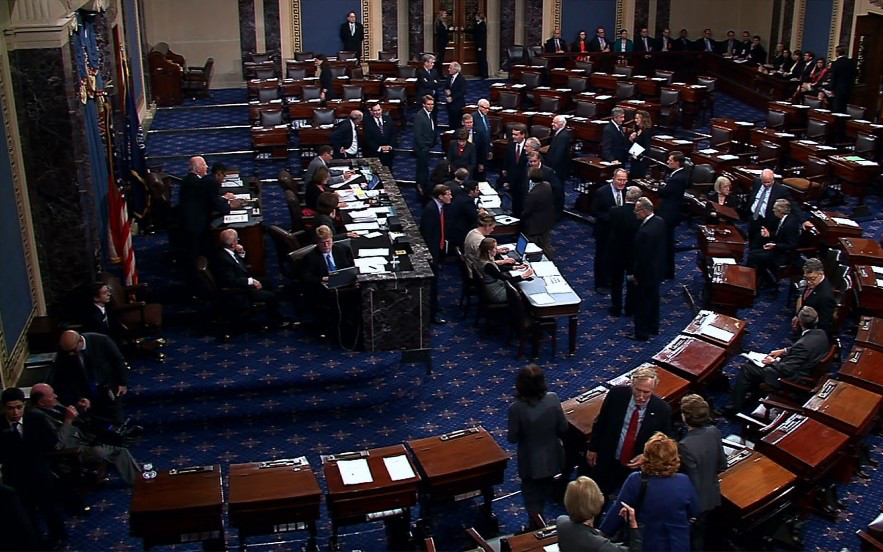15 November 2018 – Today, the United States Senate voted 77 to 21 to discharge S. J. Res. 65, a joint resolution introduced by Senator Rand Paul (R-KY), therefore blocking Senators from voting to prohibit US arms sales to Bahrain. This move by Senate leadership paves the way for further arms sales to Bahrain despite the kingdom’s atrocious human rights record, suppression of political and civil society organizations, attacks on peaceful protests, religious discrimination, and widespread and systematic torture and arbitrary detention.
The passage of Senator Paul’s resolution would have been a formal notice to the Trump administration and Bahraini government that Congress disapproves of arms sales to Bahrain. It would also have put the Bahraini government on notice that its participation in the war in Yemen is of serious concern, and signaled that there will be consequences for Bahrain if the government continues to violate human rights.
Americans for Democracy & Human Rights in Bahrain (ADHRB) strongly condemns the move by Senate leaders to block S. J. Res. 65 from coming up for a vote, and we call upon the US Senate and House of Representatives to prohibit arms sales to Bahrain and to publicly condemn Bahrain’s human rights abuses.
Commenting, Husain Abdulla, Executive Director of ADHRB, said “It is truly disappointing that Senate leadership would not allow this resolution to the floor for a vote. Stopping weapons flowing to Saudi Arabia’s allies is an important way to halt US involvement in the war in Yemen, and this resolution would have worked towards that end. But more than that, passage of this resolution would have signaled to the Bahraini government that the US is paying attention to its ongoing, widespread, and systematic human rights abuses and that the US is concerned about these. However, with the discharge of Senator Paul’s resolution, Congress has made it clear that it does not care about these violations and that the US will continue to aid and abet the Bahraini government in its suppression of fundamental freedoms.”
Background
Senator Paul’s resolution comes amidst ongoing US concern surrounding the murder of Saudi journalist Jamal Khashoggi in the Saudi consulate in Istanbul, Turkey. It also comes as Congress continues to pressure the administration to end US involvement in the war in Yemen – a war Bahrain is a part of. While Senate leaders prevented a chance to consider a resolution on arms sales to Bahrain, the House will still have a chance to consider H. Con. Res. 138, a bipartisan resolution in the House of Representatives that, pursuant to the War Powers Resolution, would end unauthorized US military involvement in the Saudi-led conflict within 30 days, unless Congress approves of such involvement. However that bill faces opposition from House Republican leaders who would water it down if possible.
In a “dear colleague” letter circulated ahead of the Senate’s consideration of S. J. Res. 65, Senator Paul portrayed the vote on arms sales to Bahrain as one about Yemen, stating “This vote is about more than weapons; this is a vote against the war in Yemen. This vote will send a message to the Saudi coalition that the Senate will not support further destruction in Yemen, and that further arms sales to participants in the Saudi coalition will be restricted until the war in Yemen is ended.”
Signal Over Upcoming Parliamentary Elections
Senator Paul’s resolution would have also sent a critical message to the Government of Bahrain ahead of its upcoming parliamentary elections on 24 November. These elections will not be, and cannot be, free and fair. The government has suppressed and forcibly dissolved opposition societies, including Al Wefaq and Wa’ad, and imprisoned important political opposition figures, in particular Sheikh Ali Salman, who was recently sentenced on 4 November to life in prison. In addition, on 13 May 2018, the upper house of Bahrain’s parliament, the Shura Council, approved an amendment to the kingdom’s Law on the Exercise of Political Rights that further restricts members of the opposition from seeking or holding elected office. The amendment permanently prohibits from running for office
- “Felons and persons previously convicted to a prison sentence of six months or more,
- Leaders and members of dissolved political organizations that were dissolved by a final sentence for committing a serious violation of the provisions of the Kingdom’s Constitution or laws,
- Whoever destroys or disrupts the conduct of constitutional or parliamentary life by terminating or leaving the parliamentary work in the Council [of Representatives] or had their membership revoked for the same reason.”
Coupled with the extraordinarily high number of political prisoners – 4,000 by some counts – this legislation further disenfranchises the political opposition.
In addition to such moves, the government has also closed all independent media outlets, having suspended the last independent newspaper Al-Wasat, in June 2017. This has been part of a larger effort to criminalize dissent and critical speech. Among those who have been imprisoned on free expression-related charges is Nabeel Rajab, the President of the Bahrain Centre for Human Rights, who is serving seven years in prison for tweets and television interviews calling attention to torture in Bahraini prisons and criticizing Bahrain’s ally Saudi Arabia for its involvement in the war in Yemen. Additionally, on 13 November 2018, Bahraini security forces detained Ali Rashed Al-Asheeri, a former Member of Parliament, after he tweeted his intention to boycott the upcoming elections in Bahrain.
These factors leading up to the elections have engendered international concern. Members of Parliament in the United Kingdom and Ireland as well as members of the US Congress and Members of the European Parliament have expressed serious concern about repression in Bahrain ahead of the upcoming election.





